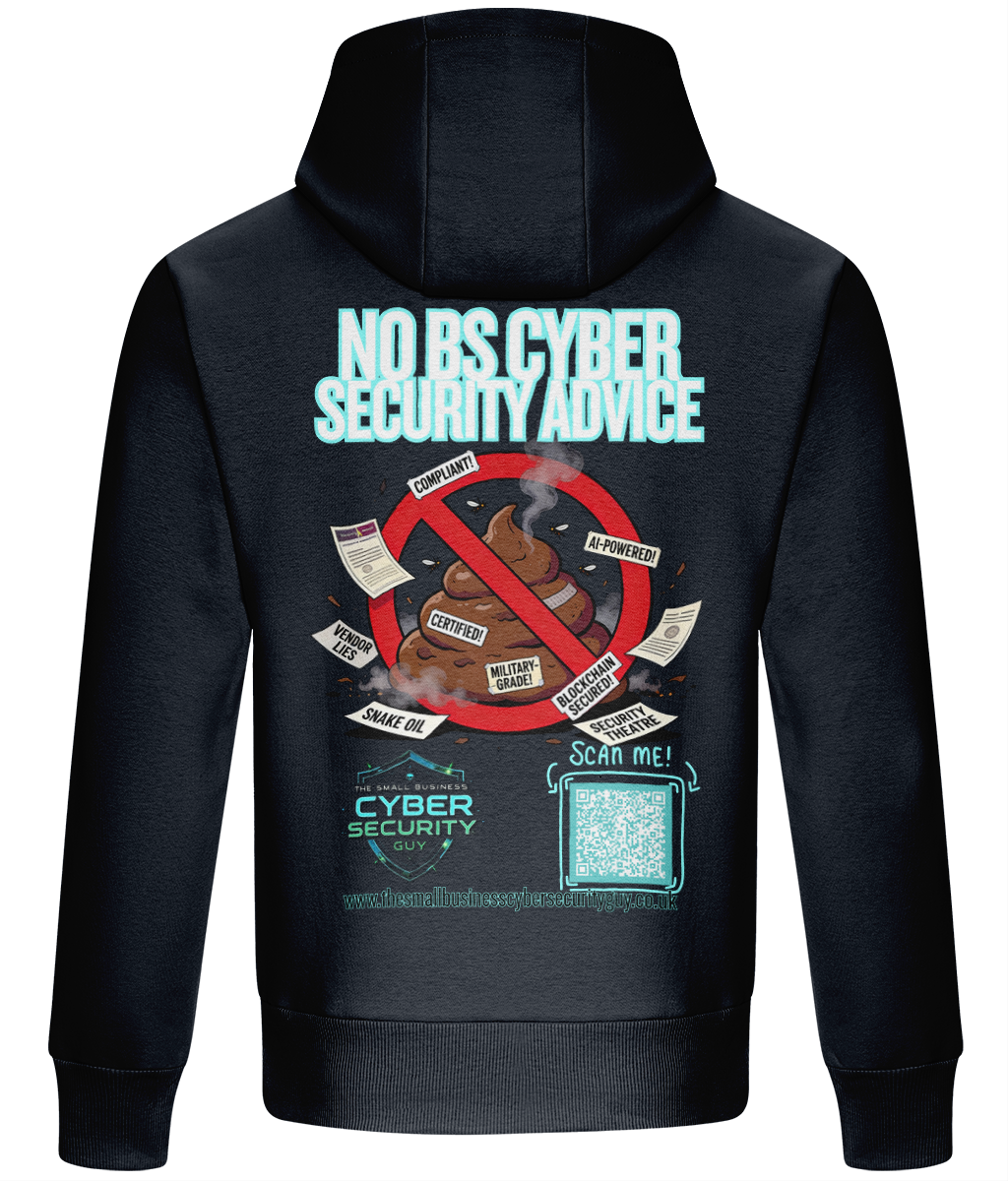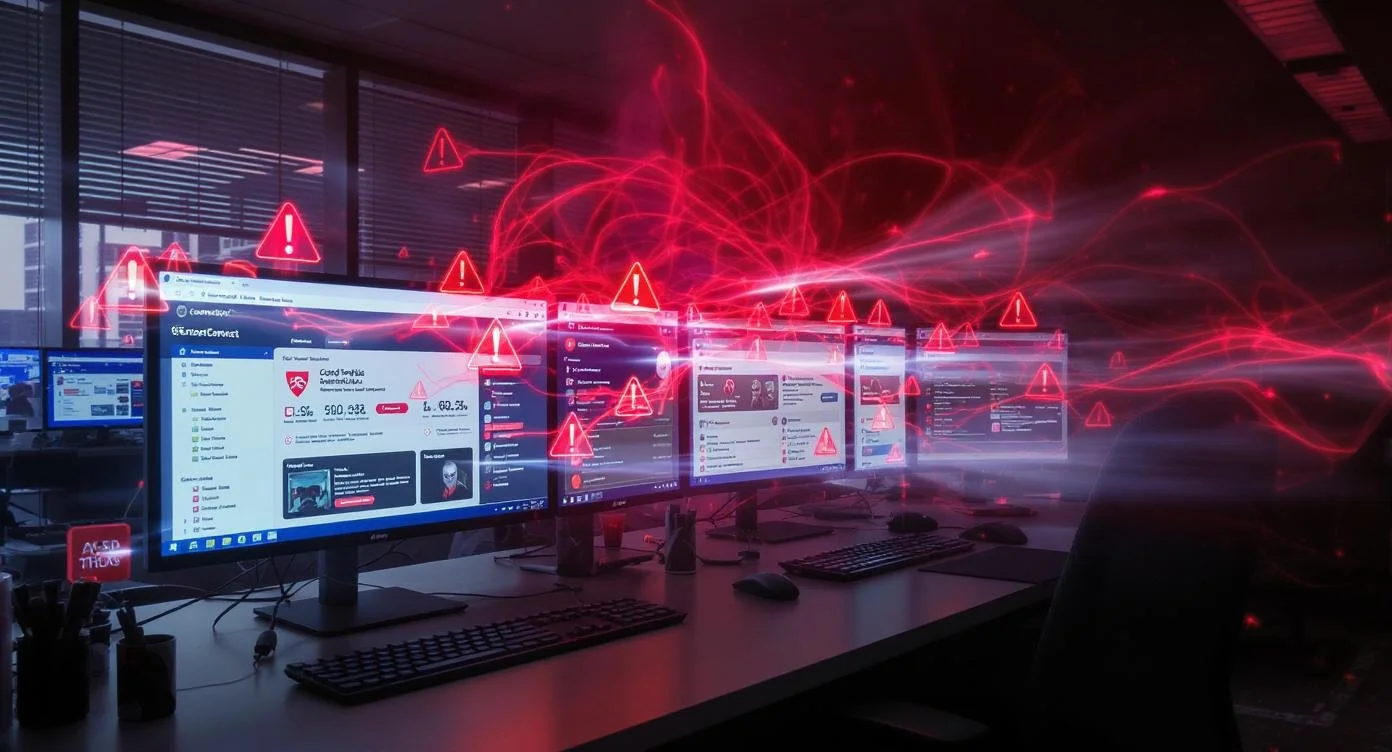⭐100K+ Monthly Downloads
⭐Top 20 Apple Management
⭐100K+ Monthly Downloads ⭐Top 20 Apple Management
The Small
Business
Cyber Security Guy
Welcome to the blog and podcast, where we share brutally honest views, sharp opinions, and lived experience from four decades in the technology trenches. Whether you're here to read or tune in, expect no corporate fluff and no pulled punches.
Everything here is personal. These are my and the team’s thoughts, opinions forged in the heat of battle! And not those of our employers, clients, or any other professional with whom we are associated.
If you’re offended, take it up with us, not them.
What you’ll get here (and on the podcast):
Straight-talking advice for small businesses that want to stay secure
Honest takes on cybersecurity trends, IT malpractice, and vendor nonsense
The occasional rant — and yes, the occasional expletive
War stories from the frontlines (names changed to protect the spectacularly guilty)
I've been doing this for over 40 years. I’ve seen genius, idiocy, and everything in between. Some of it makes headlines, and most of it should.
This blog and the podcast are where we break it all down.
Grab a coffee and pull up a chair, you need to see this!
Patch Tuesday: Critical Fixes SMBs Are Ignoring
Microsoft just dropped 51 vulnerabilities in June's Patch Tuesday, including 18 rated critical. And I guarantee you, most UK SMBs will ignore the lot. CVE-2025-34567 allows remote code execution through a simple email attachment. CVE-2025-34701 lets attackers escalate privileges with ba
sic user credentials. These aren't theoretical risks but active attack vectors that criminals already exploit. Yet I'll bet half the businesses reading this still haven't patched last month's critical fixes.
This isn't about being behind the curve anymore. This is about being a sitting duck with a neon "hack me" sign flashing above your office.
Patch Tuesday Survival Guide: Why UK SMBs Get It Wrong
It's 6 PM on the second Tuesday of the month. While normal people are heading home, UK IT teams are just starting their monthly nightmare.
Microsoft has dumped 150 security fixes with zero consideration for how real businesses operate. No test environments, no staging procedures, no time to breathe.
Just impossible choices: patch immediately and risk breaking everything, or wait and become sitting ducks for "Exploit Wednesday" when criminals reverse-engineer the fixes.
After decades of watching this monthly chaos destroy businesses, I'm done pretending it's sustainable. Here's how to survive Microsoft's security roulette without losing your sanity or your business.
Week Ahead Preview: Microsoft's Monthly Security Roulette
This week we explored compliance theatre vs real security. Next week, we're diving into the monthly war zone that every IT team knows: Microsoft's Patch Tuesday roulette where one wrong decision can sink your business.
Monday's podcast takes you inside the 6 PM chaos when UK teams scramble with late-breaking updates, and Tuesday's deep-dive exposes why traditional patch management advice is built for enterprises that don't exist.
Plus, practical survival strategies for when you're fighting attackers who reverse-engineer fixes faster than you can deploy them.
Compliance Alone Is Digital Security Theatre
After decades of watching government departments wave certificates while getting breached,
I'm done pretending compliance equals security. Yes, you need SOC 2 for some contracts. Yes, ISO27001 impresses procurement teams. But if you think those certificates will stop ransomware, you're living in a dangerous fantasy.
I've seen FTSE 100 companies with pristine audit reports get absolutely destroyed by basic phishing attacks.
It's time for some brutal honesty about what compliance actually protects (your contracts) versus what it doesn't (your business). Pull up a chair, this is going to sting.
The Midlands SME That Trusted ISO & Lost £50k Anyway
CASE STUDY: Midlands manufacturing SMB spent 18 months and £45,000 getting ISO27001 certified.
Six months later: ransomware attack, £50k losses, customer data exposed.
They had perfect documentation for email security but forgot to actually secure their email. This is compliance theatre in its purest form - expensive certificates that impress auditors but don't stop criminals.
Today's case study exposes the brutal reality of governance vs protection and what UK SMBs should learn from this expensive lesson.
When Horse Racing's Regulator Can't Secure Their Own Stable
The British Horseracing Authority just got absolutely hammered by ransomware, and frankly, I'm not surprised. Here's an organization that regulates a £1 billion industry, handles medical records for hundreds of jockeys, and oversees one of Britain's most prestigious sporting events. And they fell for the oldest trick in the book: some criminal rang their IT helpdesk, pretended to be an employee, and walked away with the keys to the kingdom. If the people who regulate horse racing can't secure their own stable, what hope do the rest of us have? Pull up a chair.
Implementing Cyber Essentials: Your 5-Step Action Plan
Tired of consultants charging £10,000 for Cyber Essentials implementation that you can do yourself in six weeks?
This step-by-step guide cuts through the consultant bollocks and shows you exactly how to implement CE yourself. Real timelines (6 weeks max), real costs (under £4,000), real templates you can actually use.
No consultant dependency, no ongoing fees, no compliance theatre. Just practical security that actually protects your UK SMB while meeting NCSC requirements.
Stop funding consultant BMWs, start securing your business properly.
Why Another SOC 2 Certified Company Just Got Breached
BREAKING: Another SOC 2 certified company just suffered a massive data breach. Shocked? You shouldn't be. While they were busy documenting their security procedures in triplicate, hackers walked through the front door they forgot to lock. This is compliance theatre in action: expensive certificates that impress auditors but don't stop criminals. Today's reality check exposes why governance frameworks fail against real threats and what UK SMBs should learn from this latest security disaster
ISO27001 vs Cyber Essentials: Real Defence vs Checkbox Theatre
Another UK SMB just spent £40,000 on ISO27001 certification. Three months later: ransomware. The compliance industry has convinced every 15-person company they need enterprise-grade paperwork to survive. Bollocks. While you're documenting your password policy in 47 formats, criminals are walking through the digital front door you forgot to lock. Today's deep-dive exposes the real cost of compliance theatre vs actual security. Spoiler: Cyber Essentials might actually protect you, ISO27001 will definitely bankrupt you
Episode 2: Compliance Theatre Won't Save You
What if everything you've been told about cybersecurity compliance is designed to empty your bank account rather than protect your business?
In this explosive episode, we exposes the compliance industrial complex convincing every 15-person company they need enterprise-grade certifications.
With NCSC insider revelations, discover why the government never intended SMBs to need ISO27001, how SOC 2 reports became "expensive fiction for executives," and the shocking real costs consultants hide. From Manchester SMEs losing £50k after £30k certifications to enterprise breaches despite perfect audits, this is your compliance wake-up call. Stop funding consultants' lifestyles, start protecting your business.
Your Smart Home is Watching: Try This Terrifying Experiment Tonight
Your smart speaker isn't just listening for 'Hey Alexa.' British Security veteran dares you to try this simple experiment tonight.
Fair warning: you might not sleep well afterwards. What you discover about your connected home will shock you into action.
Your Smart Home Is a Corporate Surveillance State: How Families Have Become Products in Their Own Living Rooms
Your smart home isn't smart: it's a corporate surveillance network that makes the Stasi look like amateurs. While you're asking Alexa about the weather, Amazon's recording everything and building psychological profiles to flog to advertisers.
Your Samsung TV captures 30 screenshots per minute, Google Home logs every conversation, and data brokers are making millions from your family's most intimate moments.
The FBI warns these devices can be hijacked, yet homes everywhere are stuffed with always-listening corporate spies disguised as convenience gadgets. We've voluntarily built our own digital panopticon and called it "smart living." Absolute madness.
Stolen Credentials Are the New Normal: Why Your Authentication Is Already Broken (And What This Means for Your Business)
Your passwords are already for sale. The only question is whether you know it yet. Stolen credentials jumped from 10% to 16% of all cyberattacks in just one year, making it the second most common attack vector behind exploits. With 3.9 billion passwords compromised by infostealer malware and 94% of people reusing the same credentials across multiple sites, your business authentication isn't just vulnerable; it's already broken. While you're investing in firewalls and endpoint protection, criminals are buying your employees' passwords for pennies on the dark web. Time to stop pretending multi-factor authentication is optional.
ConnectWise ScreenConnect: The MSP Tool That Keeps Getting Hacked (And Why Your IT Provider Won't Tell You)
Your MSP's favourite remote access tool just got breached. Again. ConnectWise ScreenConnect, the software thousands of managed service providers use to "protect" small businesses, has been hit by yet another cyberattack—this time by suspected state-sponsored hackers. But here's the real scandal: this is the same platform that suffered critical vulnerabilities in 2024, enabling ransomware gangs to turn MSP networks into criminal infrastructure. If your IT provider is still using repeatedly compromised tools while charging you for "enterprise security," you're not getting protection—you're paying for exposure. Time to ask some very uncomfortable questions.
Your Fancy New Printer Just Joined a Botnet: How Procolored Shipped Malware for Six Months
Your £6,000 professional printer just joined a criminal botnet. For six months, Procolored shipped malware-infected drivers that turned customer systems into cryptocurrency theft machines, netting criminals nearly $1 million in stolen Bitcoin. When YouTuber Cameron Coward tried to install the "legitimate" software, his antivirus screamed warnings. Procolored's response? "False positive."
Even after researchers found 39 infected files containing backdoors and Bitcoin stealers, the company kept denying reality until the evidence became undeniable. If you're still trusting hardware vendors without verification, you're not just naive—you're complicit in your own compromise.
US Spy Chief Can't Even Secure a Gmail Account: The Bloody Disgraceful Password Habits That Should Terrify Every Business Owner
The woman who oversees America's spies used the same piss-weak password across multiple accounts for years. If Tulsi Gabbard, the bloody Director of National Intelligence, can't manage basic password security, what hope do the rest of us have? This isn't just government incompetence, it's a wake-up call. When the person responsible for protecting national secrets treats cybersecurity like a Sunday crossword, every business owner needs to ask themselves: are my security practices any better? The answer will probably make you sick to your stomach.
Your Cloud Migration Just Handed Hackers the Keys to Everything You Own
Your board meeting was spectacular. "Cloud transformation complete! 40% cost reduction!" The CEO used "digital excellence" without irony. Three days later, 590 million Ticketmaster records were for sale.
The Snowflake breach wasn't sophisticated hacking—attackers used 2020 passwords from contractor gaming PCs that nobody changed. AT&T lost "nearly all" wireless customer data. Santander: 30 million records including account balances. None had basic multifactor authentication. While executives celebrated digital transformation, cybercriminals exploited the fundamental misunderstanding that cloud security is someone else's problem. The shared responsibility model? Perfect excuse for everyone to assume the other guy handles security.
North Korean IT Workers Are Already Inside Your Company (And HR Just Gave Them Admin Access)
It's 2025. You're reviewing quarterly security metrics, feeling pleased with zero phishing attempts. Meanwhile, the developer who pushed code yesterday is funnelling his salary to Kim Jong Un's nuclear programme.
One facilitator helped infiltrate 300+ US companies, generating $6.8 million for weapons development. Google found them applying to Google. Cybersecurity vendors accidentally hired them.
If the experts are getting played, your HR department doesn't stand a chance. They're not just collecting paycheques—they're systematically funding WMDs while your compliance team ticks boxes about background checks.
Why Iranian Hackers Are Better at Social Engineering Than Your Sales Team
Pull up a chair. We need to talk about something that's going to make your skin crawl.
While your sales team struggles to get prospects to return a bloody phone call, Iranian threat actors are convincing your employees to hand over the keys to your digital kingdom with the kind of charm and persistence that would make a used car salesman weep with envy. These aren't basement dwellers sending "Nigerian prince" emails—they're sophisticated operations turning social engineering into an art form while most organisations treat it like a compliance checkbox.
When fake job offers become delivery mechanisms and your "cybersecurity awareness" training is more obviously fake than actual attacks, you've got a problem that technical controls can't solve.
Lawyers, Judges, and a Bloody SharePoint Backup: When Legal Privilege Meets Cyber Incompetence
In one of 2025’s most disgraceful breaches, Lawcover — the indemnity insurer for thousands of lawyers — exposed the personal and financial data of judges and solicitors through an unencrypted SharePoint backup. It’s not a sophisticated hack; it’s old-school negligence.
Five-year-old legal records, sensitive case data, and passport numbers were all left to rot in the cloud. The incident highlights just how dangerously out of touch the legal sector is when it comes to basic cyber hygiene. In this brutally honest breakdown, we unpack what went wrong, why it matters for the UK, and why your supply chain is now your attack surface.
⚠️ Full Disclaimer
This is my personal blog. The views, opinions, and content shared here are mine and mine alone. They do not reflect or represent the views, beliefs, or policies of:
My employer
Any current or past clients, suppliers, or partners
Any other organisation I’m affiliated with in any capacity
Nothing here should be taken as formal advice — legal, technical, financial, or otherwise. If you’re making decisions for your business, always seek professional advice tailored to your situation.
Where I mention products, services, or companies, that’s based purely on my own experience and opinions — I’m not being paid to promote anything. If that ever changes, I’ll make it clear.
In short: This is my personal space to share my personal views. No one else is responsible for what’s written here — so if you have a problem with something, take it up with me, not my employer.
























